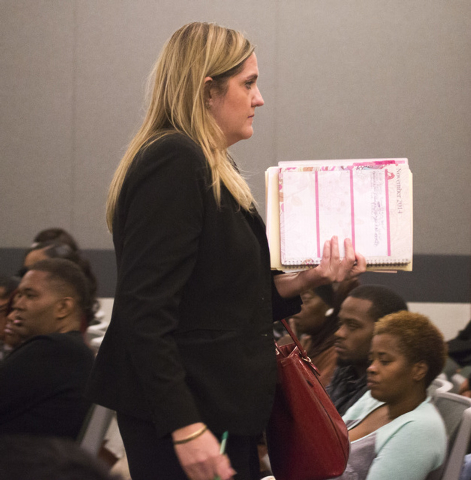Judge: Lawyers should have questioned witness payment sooner
Both sides of the criminal justice system — defense and prosecution — appeared to fall short in the case of a 2008 after-school shooting, a Clark County judge said Tuesday, but that didn’t compel him to toss a conviction.
Judge Michael Villani denied defense attorney Betsy Allen’s motions to overturn the conviction after questions about witness payments arose.
The judge said he didn’t find prosecutorial misconduct or intentional deception by prosecutors as she alleged. It was the latest case brought back to court in light of a Clark County district attorney’s office practice of paying witnesses’ rent using an off-budget checking account.
What the judge did find was that defense attorneys should have pushed harder after prosecutors in a court filing made a passing reference to helping a witness with moving expenses due to threats.
“[The reference] wasn’t as specific as perhaps it should have been, but it does identify that they did receive benefits,” Villani said. “There should have been followup.”
Allen represents Franklin Jackson, who was convicted of one count of conspiracy to commit murder and seven counts of attempted murder with a deadly weapon in the shooting. He was 17 at the time of the crime but was tried as an adult.
Prosecutors said Jackson was part of a plot to attack another teen after he got off a school bus from Mojave High School in North Las Vegas. The shooting — which left six wounded — was punishment for an earlier altercation, prosecutors argued.
Mojave student David Macias had bumped into Nicco Tatum the day before the shooting, prosecutors said. An apology wasn’t enough for Tatum, who enlisted Jackson and other friends to exact revenge, prosecutors argued.
Tatum pleaded guilty to attempted murder with a deadly weapon.
Allen argued when she did a standard review of prosecutors’ files that the paperwork showing the district attorney’s office covered $500 in rent wasn’t there. Assisting with moving expenses could mean a lot of things and there’s a big difference between renting a moving truck and paying rent, Allen said.
But nothing stopped Allen or the other defense attorneys on the case from raising these points before or during trial, the judge said.
Allen could have brought it to the court’s attention that paperwork appeared to be missing from the file, since she was told a witness had been given something. Clearly, the judge said, he would have ordered more information about the assistance be turned over.
And why, the judge asked, wasn’t the witness questioned at trial about any benefits she may have received?
Allen said she could not remember why questions weren’t asked of witnesses during the 2009 trial and that she was limited in her ability to investigate the case because of the DA’s office open file policy. She has to assume when she reviews a prosecutor’s file she has access to everything, she said.
This was the second time information about these witnesses wasn’t in the case file, she said.
Jackson previously appealed his conviction, contending prosecutors hadn’t disclosed a note the mother of the same witness slipped to detectives that led them to investigate Jackson. But prosecutors said the note was in a trial notebook that the defense reviewed. The Supreme Court denied that appeal, not weighing in on whether the information was disclosed.
Allen argued the note regarding those witnesses and now the rental expense begged for attention. The detective who helped crack the case by convincing the mother and daughter to cooperate didn’t testify at trial and at the time she couldn’t figure out why, Allen said.
Armed with the note and the rental payment, now Allen has questions for that detective.
It will be up to Jackson to decide if he wants to pursue those questions through other appellate means, possibly by arguing his defense counsel was incompetent.
In another case, the issue of whether the defense was told about rental help is cut-and-dry.
Chief Deputy District Attorney David Stanton admits he didn’t tell defense lawyers for a man facing the death about a $500 payment to a witness, arguing he didn’t have to because knowing about the rental payment wouldn’t have helped the man’s case.
Judge David Barker will hear that case, about a woman murdered with a machete, Nov. 14. Barker has said he plans to issue a written order, an indication he is giving it extra attention.
District Attorney Steve Wolfson changed policy following defense attorneys’ shock and outrage over the payments. Now, defense attorneys will be notified of all past payments dating back to 2005 and all future payments, Wolfson said in an August statement.
A public records request showed more than 50 payments were made to cover witnesses’ expenses over the course of a decade. It was unclear how many criminal cases were involved because the district attorney’s office would not release records showing case numbers.
Contact Bethany Barnes at bbarnes@reviewjournal.com or 702-477-3861. Find her on Twitter: @betsbarnes.




















